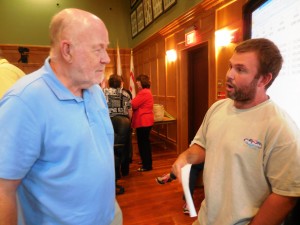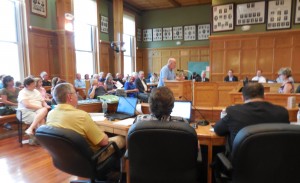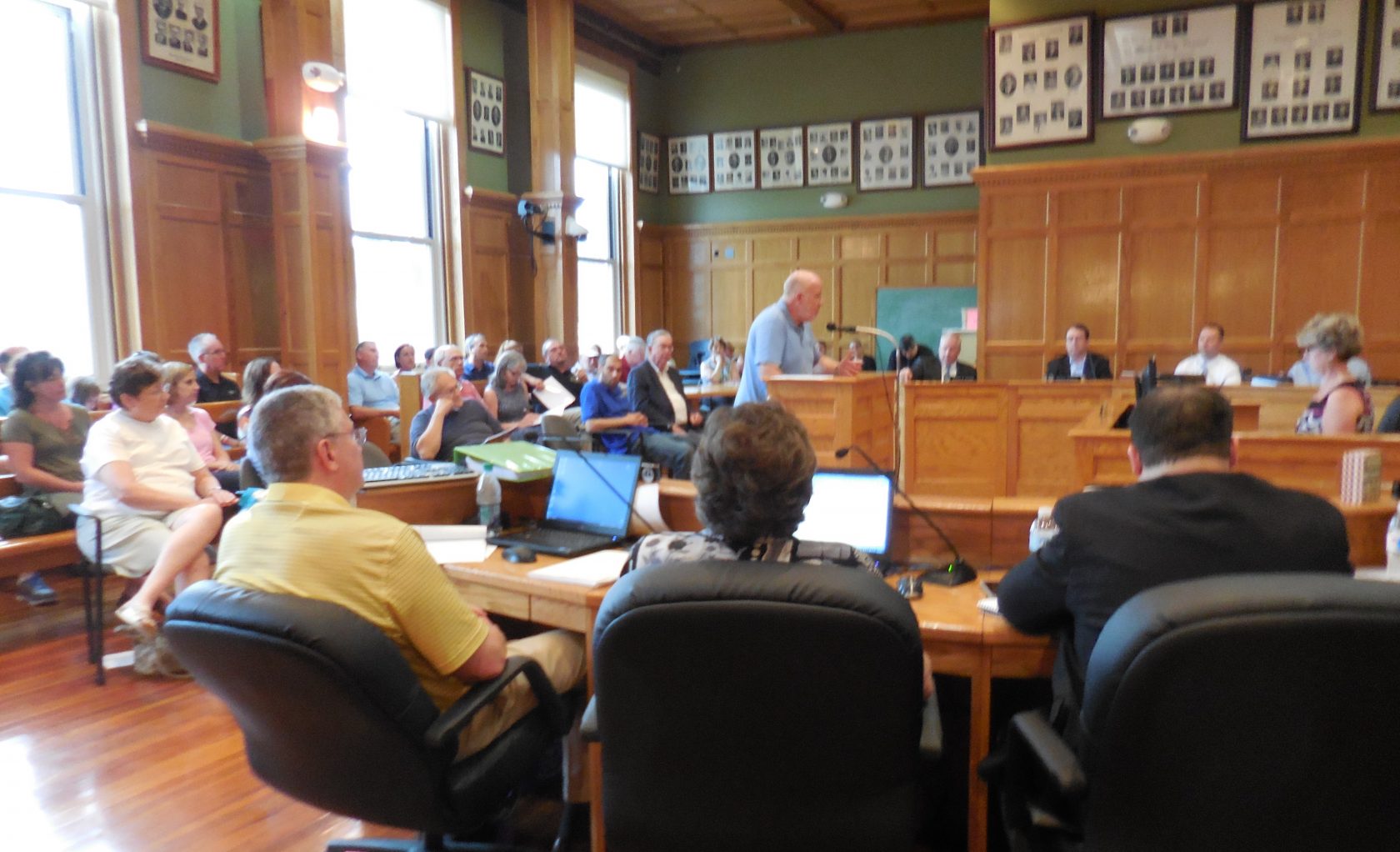WESTFIELD – There was no shortage of input for the Finance Committee at the public hearing on the budget Monday night. Special education parents spoke in force, concerned about the effects of further cuts on their children’s education. Representatives of the business community asked to curtail spending and to stop increasing taxes. Several residents spoke in favor of the meals tax as a new source of income, with one suggesting it should be earmarked for the school department.
At the start of the meeting, Ward 5 Councilor Robert A. Paul, Sr., who chairs the Finance Committee, said the goal of his committee is to bring forward proposals that would yield a 0% tax increase. He said they will take all of the input and analysis from Council members and the public, and put it all together on Tuesday evening for a City Council meeting of the whole on Wednesday, and then a vote on Thursday.
City Council president Brent B. Bean, II, then opened the meeting up for public comments.

School Committee member William Duval and resident and property owner Matthew Emmershy continue the debate following the public hearing on the Westfield city budget Monday. (Photo by Amy Porter)
First to speak was Michele Douglas of SEPAC, the Special Education Parent Advisory Committee.
“I want the first discussion to be the school budget. I’m part of SEPAC. My son is six with an autism diagnosis. Those cuts affect my son’s life,” Douglas said. She said the school department has cut two special education supervisors, one of whom is her child’s supervisor.
“I can’t tell you how difficult the life of a special education parent is in the City of Westfield,” Douglas added. She said she believed there should be zero cuts to the school department budget, and that she would pay more taxes if she knew her child would get a better education.
Finance Committee member, At-Large Councilor Matthew T. VanHeynigen clarified that the $600,000 the committee recommended as a cut to the school budget is a motion for the City Council to vote on.
“There will be a lot of options. It’s a multiplicity of voices,” Paul said.
At-Large Councilor David Flaherty was not as consoling.
“The school budget is going up. They don’t live within their budget. They can negotiate better,” Flaherty said, adding that the current budget before the City Council contains a 3.68% increase to the city, not a cut.
“The $600,000 will result in cuts. One of the things they’re looking at is teacher’s assistants,” responded At-Large Councilor Steven Dondley.
School Committee member William Duval came to the podium saying he was representing himself as an individual, not the committee.
“I want to represent the taxes as an investment. How much money am I putting in, and more importantly, what am I getting for my investment,” Duval said, giving as an example, EMTs, the ambulance corps, and the police.
“When I came to Westfield in 1970, people said two things to me. `It’s a good place to live, and a great place to raise kids.’ The better educated somebody is, the more income they make, the more taxes they pay and contribute to the city,” Duval added.
Another special education parent spoke about how her daughter, who is 15, could not be educated by Westfield Public Schools, and is now attending the White Oak School, which she called a “gem” for the city. She said to consider that the more cuts that are made, the more children may have to go elsewhere, costing the city $40,000 per child.
Estelle Streeter, a former librarian in the Westfield Public Schools, spoke about the cut to five paraprofessionals in the school budget this year.

Diverse opinions on the Westfield city budget were aired at the public hearing on Monday evening. (Photo by Amy Porter)
“Once you take something away from a child’s education, you can’t get it back. $80,000 to cut five paraprofessionals, that’s sad. Shows you how much they’re paid, but not how much they work,” Streeter said.
Another special education parent said her son’s paraprofessional was key to his IEP (Individualized Education Plan) and has been cut. She said her family has now hired an advocate.
“What we’re trying to do as parents, is to work with what we have. It’s been a very difficult year as a parent. I know they’re trying. I would really like you to consider not cutting any more,” she said. Another resident said the new superintendent should be given a chance before his hands are tied.
Kate Phelon, Executive Director of the Westfield Chamber of Commerce, thanked the members of the Finance Committee for their hard work and transparency. She said in business, there are hard choices to make concerning budgets.
“From the Chamber’s perspective, I would like to ask the Council to support the Finance Committee’s recommendation of no tax increase,” Phelon said.
The City Councilors then took a few minutes to weigh in, before Bean reminded them that this was an opportunity for the public to speak.
“We can’t control how the school spends their money. It’s the fastest growing organization. We have to control how we’re spending,” Flaherty said. “I’m very sympathetic about paras. They came to us with a budget before we proposed cuts that cut paras,” he added.
Flaherty also stated that the city is 2 ½ years away from not being able to raise more taxes, and not paying its obligations in OPEB (Other Post Employee Benefits), which are at $230 million. “All we’re trying to do is control spending,” Flaherty said.
“One of the remedies we’ve proposed is to increase the capacity of the school through technology,” Paul added.
Former Mayor and At-Large City Councilor Dan Knapik also weighed in, sharply criticizing some of the Finance Committee’s contentions, especially Flaherty’s comparison to the City of Holyoke, which he said has reached its taxable limits.
“The fact is Westfield is a far cry from Holyoke. We have land wealth. The OPEB liability went down 40 million. We are not going to hit the levy ceiling. We’re one of the best retirement cities in the state,” Knapik said.
He said that the state is $1 billion short on aid for Chapter 70 (school funding), but asked why should they give the city more money if Westfield doesn’t take advantage of the tools they’re already given, such as the hotel and meals tax.
“I personally don’t think that we’re going to solve the school’s problems with a tech bond. The Mayor already did a tremendous amount of cutting, and the school department came out with a $750,000 cut. I’ve listened to you for years,” Knapik said, referring to Flaherty, “and I have yet to see how you’re going to figure it out.” He also noted that OPEB is not due today.
Ward 4 Councilor Mary O’Connell challenged Knapik, saying that he should make his suggestions at the Finance Committee meetings which she has attended. “I certainly hope you show up,” she said.
Another resident spoke up about investment in the city, asking that taxes be used for infrastructure improvements. He said he didn’t see anything in the budget for sidewalks, ADA compliance, and sanitary sewer connections.
Referring to the recent contamination from two wells, he said the city needs to focus on areas without connections. He also said he didn’t see funds for capital projects.
“Going forward, we all have to look at how we’re going to fund the improvements that have been identified,” he said.
“I live in town presently. I’m also a landlord. I’m actually breaking ground out of town for myself, because the taxes in this town are so uncertain. I have two children myself, which is why I want out because the schools aren’t performing, considering the money we’re giving,” said resident Matthew Emmershy.
“We’ve heard universally from the Finance Committee that there are places to cut. Ultimately, hard decisions have to be made. With these constant tax increases, you’re running out of road. I’m still going to have property in town, but that’s why I’m looking to get out,” Emmershy added.
Westfield City Engineer Mark Cressotti spoke in favor of the meals tax and the hotel tax. He said the City of Westfield has made “humongous” strides in the last ten years.
“My feeling as a lifetime resident, my parents, too, is that I hope to have my children live here as well. The kind of investment we’re making is so our kids would choose to live here,” Cressotti added. He also said that the Mayor has already made significant cuts in the budget.
Councilor Paul thanked the residents for their participation, and said their input would be considered during final Finance Committee deliberations Tuesday evening.


